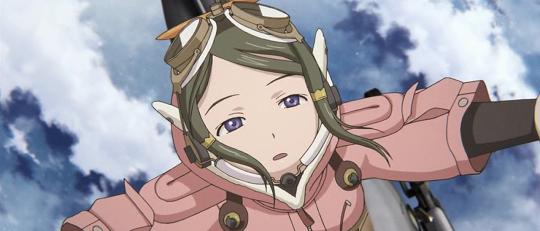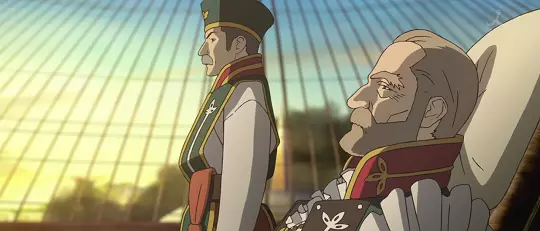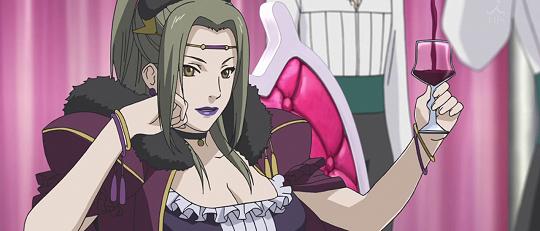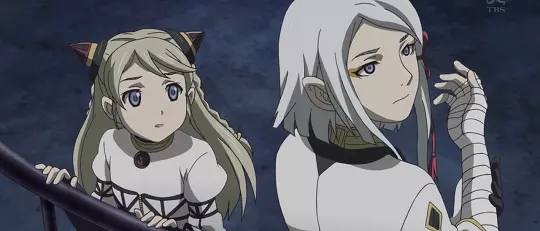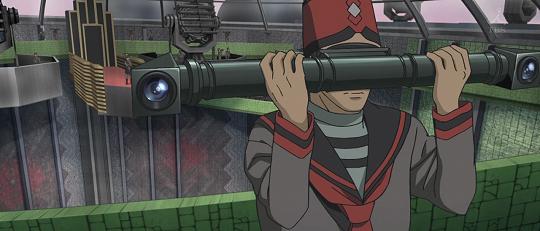Nowadays incredulity follows the Gonzo logo. That once stalwart mark associated with Gankutsuou and Full Metal Panic, which in its latter years branded atrocity (Dragonaut) and mediocrity (Speed Grapher) alike and culminated in the studio's unceremonious booting from the lucrative Strike Witches franchise.
It's with much surprise then that Last Exile: Fam of the Silver Wing is so good. Not just "good for Gonzo", but genuinely entertaining. Could this be the series to restore the studio's lustre and break it free from a reputation of shoddy endings?
The first series of Last Exile didn't set the world on fire like a 10th Anniversary show should, however it had a unique blend of steam-punk styling and airship fetishising that made it pleasant to watch even when haphazardly animated. With eyes on a grander narrative the purely character driven plot of the first series is mutated into something more political and imperialist.
Warring nations, splintered families and the horrors of war visited upon children. It's closer to the themes flogged to death by Gundam or even the latter series of Code Geass and similarly drawn with fat, crayon strokes with telegraphed successions and shifts in alliance. The same tired climaxes from those series are brought to bear here. As soon as the nuclear-weapon analogue is rolled out the ending is set: either the antagonists du-jour win and the world lives in a tyrannical peace, or the allies win and their unification under a common goal sweeps aside their previous grievances. That the super weapon here is a super-massive unfinished spaceship with flowers for weapons is immaterial.
The focus on the politics of war is at the expense of character development to the point that come the ending, the antagonist's motives are still an enigma and the protagonist - the titular and cherub-like Fam - is left almost a complete cipher. Seemingly secondary characters are afforded more growth such as Millia who goes from snobby princess to ace airship captain while Dio, returning from the first series, is half as crazy and twice as whimsical yet his catatonia and demise there is entirely ignored, despite the interstitial episode devoted to his back story.
Other political figures such as Augusta Sara and Vasant bely a world that sends its chivalrous men to war but is governed by a grand matriarchy. Idolatry and patriotic zeal underpin this conflict with one nation raising the ineffectual child Sara as a battle-standard and another throwing its best pilots, the valkyries of the sky, headlong into rocket-propelled suicide missions.
It's stirring stuff and it's hard not to be moved as a phalanx of floating warships razes country after country, bolstered by a sountrack that sports stunners like "Gamesmanship" and "Red-Letter Warfare". Even replacing the iconic opening tune by Dolce Triade with Maaya Sakamoto proves to be a winning choice, especially with her cameo as a sultry race mistress.
That cameo unfortunately epitomises the rather wayward opening episodes. Once they subside however, skirmishes come thick and fast and are with some exceptions easy to follow and various enough to be enthralling. Pleasingly, with Sun Tsu's teachings in full effect, battles regularly rely on strategy and cunning rather than an arms race to build a bigger gun.
Were the series smarter it would have focused on this warmongering and the already accomplished world building rather than trying to bake in morals and ideals. The result is that neither is afforded the attention it demands, with the strife of nations often lacking context and the themes lack bite, like attempting to demonstrate that speeches can overcome blind nationalism and steel. Fam's naivete and earnestness never achieve the contrast to the bloodshed obviously intended, instead straying close to annoyance, just as Sara's innocence and Millia's familial bonds are never adequately explored.
Likewise the blatant real-world connection of each nation - American imperialism, an isolationist Russia/North Korea, a very British cavalry charge - let the otherwise superb setting down slightly and, however implausibly, more story threads are left hanging than the first series. How did Dio survive his swan-dive into the Grand Stream? Who controls the other Exile's hanging in the sky? Why is Dian forgiven for what amounts to regicide? What was Lusciana's plan with the Grand Exile?
So Gonzo are back to their old tricks: blindside the audience with high-concept aesthetics and ideas but falter in either conviction or talent to follow through. It is sometimes poignant, othertimes goofy, frequently beautiful and sporadically smart but don't misunderstand: Last Exile: Fam of the Silver Wing succeeds Last Exile in almost every regard. That there are issues with what is an immensely ambitious narrative and nigh-on impossible balancing act does not dampen a thoroughly entertaining series.
